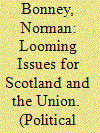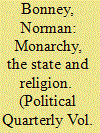| Srl | Item |
| 1 |
ID:
084377


|
|
|
| 2 |
ID:
096257


|
|
|
|
|
| Publication |
2010.
|
| Summary/Abstract |
Aspects of contemporary monarchy and government in relation to religion are out of step with contemporary society and require systematic reform. The removal of religious and gender discrimination in the arrangements for succession to the monarchy would be in conformity with modern anti-discrimination attitudes. The monarchy should also consider stepping back from its religious role. The monarch has an official role as Supreme Governor of the Church of England but less than a quarter of the population identify as Anglican and in its current attempts to be inclusive the monarchy seeks to respect and support other religions whose beliefs and practices are at variance with those of the C of E and the general population. In Scotland a new settlement could be promoted by the disestablishment of the Church of Scotland (comparable to the situation in Wales and Northern Ireland) and the ending of separate Roman Catholic state education.
|
|
|
|
|
|
|
|
|
|
|
|
|
|
|
|
| 3 |
ID:
127004


|
|
|
|
|
| Publication |
2013.
|
| Summary/Abstract |
The Scottish independence referendum debate, like the Act of Union of 1707, has significant religious dimensions. The Act gave special recognition through the monarch to the Presbyterian Church of Scotland. The Church, a national church, has not yet declared a position on independence, but is seeking to protect its existing privileges whatever the result. The Roman Catholic Church, recognised by the Scottish Parliament, unlike its formal rejection by the UK Parliament and monarchy, symbolically associates itself with the case for independence. Paradoxically, Catholics supporting independence subject themselves, in their religious lives, to an authoritarian foreign power. The SNP Scottish Government attempts to draw Roman Catholic support for independence from its traditional support base in the Labour Party by cultivating a sense of religious grievance that is not justified by the evidence. Old religious divisions are still relevant but non-religion is growing fast and resulting in new perspectives on the independence debate.
|
|
|
|
|
|
|
|
|
|
|
|
|
|
|
|
| 4 |
ID:
108320


|
|
|
|
|
| Publication |
2011.
|
| Summary/Abstract |
Despite secularisation and increased religious diversity the UK state and the monarchy are religiously legitimated institutions which have their origins in protestant/catholic divisions over three hundred years ago but which remain strong enough to survive in the current era. The Church of England acts not only as the established church of England but as a church for the UK with respect to events such as the coronation and the royal wedding of 2011. Ecumenical and interfaith initiatives have been attempted by the government and the monarchy and were evident in attendance at the wedding but it demonstrated the ritual supremacy of the state church and the inevitable difficulties of seeking to achieve formal representation for religious diversity in the state. Attempts at more formally inclusive religious involvement in state institutions conflict with other goals such as gender equity and suggest that secular state institutions might be fairer to all religions, denominations and those with no beliefs.
|
|
|
|
|
|
|
|
|
|
|
|
|
|
|
|
| 5 |
ID:
112085


|
|
|
|
|
| Publication |
2012.
|
| Summary/Abstract |
The plans of the Scottish Executive/Government for the independence of Scotland, which are very sketchy, are explored in relation to desire to retain the monarchy. The Scottish Parliament has expressed support for the removal of religious discrimination from succession to the throne and instituted an alternative state religion-measures which suggest an alternative relationship between religion and the monarchy will be required in an independent Scotland. Repealing the Act of Union will require decisions as to whether the monarchy remains as Christian, Protestant and Presbyterian in Scotland or whether some alternative religious or secular arrangements will be developed. Accepting the existing religious settlement of the monarchy, or varying it, will generate challenging issues for a Scottish administration that is seeking to be more religiously inclusive.
|
|
|
|
|
|
|
|
|
|
|
|
|
|
|
|
| 6 |
ID:
122487


|
|
|
|
|
| Publication |
2013.
|
| Summary/Abstract |
While most nationalised enterprises have been privatised and made subject to the market, the Church of England, with considerable but not complete autonomy, remains ultimately a state controlled and governed organisation. The growth of secularism and religious diversity has demonstrated that the Church has failed in its mission to be the Church of all the people of England. Its share of the marriage market has shrunk to one in four and most weddings are now secular. It retains a monopoly of UK state religious ceremonial but in attempting to adjust to contemporary forms of religiosity it has become, in contradiction of its founding 16th century articles, the leader of official state interfaith activities and the arbiter and broker for the participation of a restricted range of other religious denominations in state activities. Releasing the Church from state control and creating a more open market for religion and belief will create a level playing field for all denominations and a better correspondence between citizen attitudes and public actions.
|
|
|
|
|
|
|
|
|
|
|
|
|
|
|
|
| 7 |
ID:
112086


|
|
|
|
|
| Publication |
2012.
|
| Summary/Abstract |
The government plans to amend the royal succession rules by making primogeniture gender blind and ending marriage to a Roman Catholic spouse as a disqualification for succession. Achieving these goals means that the UK is dependent on the agreement of the fifteen Commonwealth countries-the 'realms'-that also have the Queen as head of state. The article questions whether these proposals go far enough when leaving intact other religious discriminatory rules hostile to Catholics and all others who cannot be in communion with the Church of England. It is maintained that a political disinclination to address and, as necessary, challenge the real as opposed to the formal position of the Church of England vitiates the government's approach. Moreover, it is asked whether the policy process itself should not become more open and democratic both within the UK and between the realms.
|
|
|
|
|
|
|
|
|
|
|
|
|
|
|
|